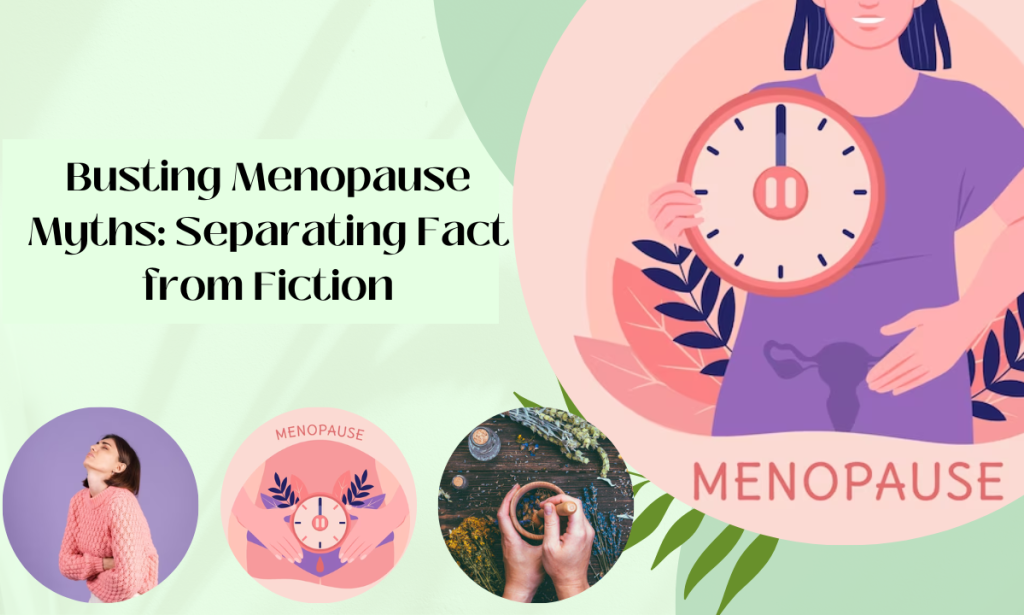Menopause and the World of Misinformation
Menopause, a natural phase in every woman's life, often comes surrounded by a plethora of myths. From terrifying tales to wonder solutions, it's a challenge separating fact from fiction. Thankfully, as we'll see, there's a credible realm of natural remedies for menopause that can provide authentic relief.
Common Myths Surrounding Menopause
1. Menopause Only Affects Older Women
Reality: While the average age for menopause is around 51, symptoms can begin as early as the late 30s or early 40s, known as perimenopause.
2. Menopause Causes Irreversible Weight Gain
Reality:Metabolism does slow down with age, but weight gain isn't inevitable. With a balanced diet, regular exercise, and a healthy lifestyle, it can be managed.
3. Intimacy Ends After Menopause
Reality: Though some women experience vaginal dryness or a decrease in libido, intimacy can very much be a part of life post-menopause. Various treatments, including some natural remedies for menopause, can address these issues.

4. Hot Flashes are the Only Symptom
Reality: Hot flashes are common, but menopause can also lead to mood swings, sleep disturbances, and cognitive changes.
5. Osteoporosis is Guaranteed After Menopause
Reality: It's true that the decline in estrogen during menopause can lead to a decrease in bone density, but osteoporosis isn't a guaranteed outcome. Diet, lifestyle choices, genetics, and overall health play significant roles in determining bone health. Consuming calcium-rich foods and engaging in weight-bearing exercises can assist in maintaining bone strength.
6. Menopause Marks the Start of Cognitive Decline
Reality: While some women report memory lapses or foggy thinking during menopause, there's no substantial evidence linking menopause directly to cognitive decline. Stress, sleep disruptions, or other factors might contribute to these symptoms. Keeping the mind active and engaged can fend off such issues.
7. Menopause is a Disease That Requires Treatment
Reality: Menopause is a natural transition, not a disease. While treatments (including natural treatment for menopause) exist to alleviate symptoms, not every woman will require them. Some women go through menopause with minimal or manageable symptoms.
8. All Women Experience Severe Mood Swings
Reality: While hormonal fluctuations can influence mood, not every woman will experience severe mood swings. Factors like stress, lifestyle, and pre-existing mental health conditions can also play a part. Engaging in regular physical activity and relaxation techniques can help balance mood.

Natural Remedies for Menopause: A Dive into Authentic Solutions
The appeal of natural treatments is undeniable. Let's explore how they can alleviate some menopausal symptoms:
1. Black Cohosh: Widely recognized for its potential to reduce hot flashes and night sweats.
2. Phytoestrogens: Found in foods like soybeans, these can act like estrogen in the body, potentially easing menopause symptoms.
3. St. John’s Wort: Known to be effective for mood swings and depressive symptoms associated with menopause.
4. Evening Primrose Oil: Frequently recommended to alleviate symptoms, especially hot flashes.
5. Acupuncture and Yoga: Both are becoming increasingly popular as natural treatments for menopause, helping in managing sleep disturbances, mood changes, and even hot flashes.
Dietary Changes: Consuming a balanced diet rich in essential nutrients can be pivotal. Foods high in Omega-3 fatty acids, like fish, can potentially help with mood swings. Calcium and Vitamin D-rich foods can support bone health.
Herbal Teas: Herbs like valerian root can help with sleep disruptions, while chamomile can aid relaxation and mood.
Mindfulness and Meditation: Regular mindfulness practices and meditation sessions can be a sanctuary for many women, helping manage stress, anxiety, and mood fluctuations.
Regular Exercise: Physical activity is not just for weight management. Regular exercise can boost mood, improve sleep, and support overall well-being.
Community Support: Joining menopause support groups, both online and offline, allows women to share experiences, offer advice, and provide comfort during this phase.
Why Natural Over Conventional?
The allure of natural remedies is rooted in their minimal side effects and their alignment with the body's natural processes. While Hormone Replacement Therapy (HRT) remains a standard treatment, concerns about its side effects make natural remedies a sought-after alternative. However, it's crucial to consult with a healthcare provider before starting any new regimen.
The Cultural Perspective on Menopause
Our understanding and approach to menopause are also shaped by cultural perspectives. In many Western cultures, menopause is often viewed negatively, clouded by myths and misunderstandings. In contrast, certain Eastern cultures regard it as a positive transition, symbolizing a move from a more youthful, restless phase to a wiser, more settled period.
By understanding these varying perspectives, we can glean that menopause is not just a biological transition but also a cultural and personal experience.
Understanding Individuality in Menopause
One fundamental truth that often gets overshadowed by the blanket statements surrounding menopause is the concept of individuality. Every woman's experience is unique. Factors like genetics, health history, lifestyle, and even personal beliefs can shape how one undergoes this transition.

The vast array of natural remedies for menopause further emphasizes this individuality. What works wonders for one might be ineffective for another. The key lies in understanding one's body, staying informed, and seeking a tailored approach to menopause.
In Essence: Celebrating Transition
Instead of being a period marked by loss, menopause can be a celebration of transition. By busting myths, seeking genuine, effective solutions, and understanding the deeply personal nature of this phase, women can move forward with optimism and grace. With the right knowledge and resources, including natural treatments for menopause, the journey can be empowering and transformative.
Conclusion: Navigating Menopause with Grace and Knowledge
Menopause isn’t a disorder but a natural transition. Equipped with accurate information and effective natural remedies for menopause, women can navigate this phase with confidence and ease. Always remember, every woman’s journey is unique, and there's no one-size-fits-all solution. Embrace the transition, stay informed, and seek the best individual path forward.
Note: While natural remedies offer a gentler approach, it's essential to remember that individual reactions may vary. Always consult with a healthcare professional to determine what's best for your unique situation.



You must be logged in to post a comment.